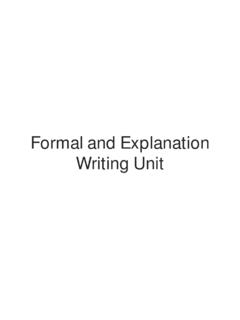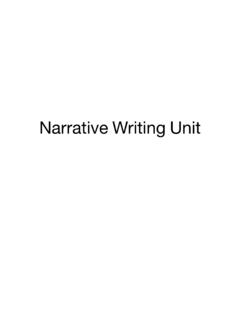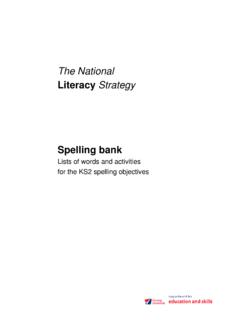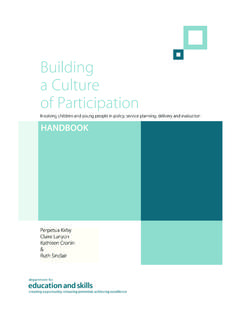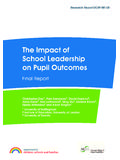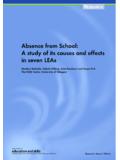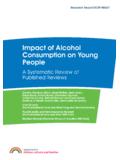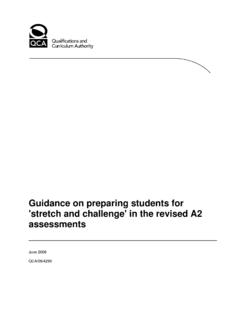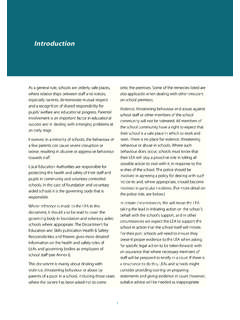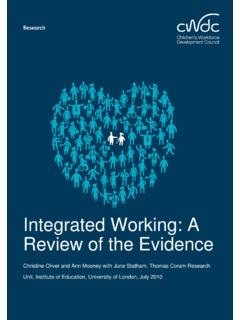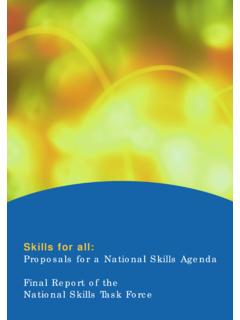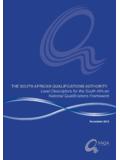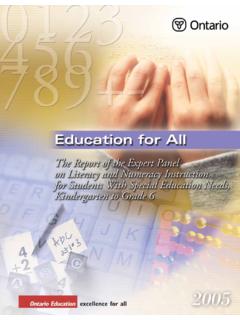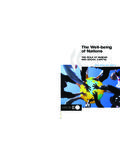Transcription of Including Language, Literacy and Numeracy …
1 Including Language, Literacy and NumeracyLearning in all Post-16 EducationGuidance on curriculumand methodology forgeneric initial teachereducation programmes2 ForewordIn November 2002 the Government published Success for Alloutlining its commitment to raisingstandards, increasing participation and improving outcomes for learners. It sets out the need for alearning and skills sector that offers adult learners increased access to excellent provision for thedevelopment of language , Literacy and Numeracy skills. In addition, it reinforces the principle that allteachers should be qualified to teach. The Department for Education and Skills (DfES) is committed tosecuring an appropriately qualified workforce for all the contexts within the learning and skills for Life,the national strategy for improving adult Literacy and Numeracy skills aims to raiseachievement by improving the status and quality of training available, Including raising the level ofqualifications for teachers of adult Literacy , Numeracy and English for Speakers of Other Languages(ESOL).
2 Both Skills for Lifeand Success for Allcontribute to fulfiling the Department for Education andEmployment s stated intent from November 2000, that all teachers in the post-16 sector shouldfollow teacher-training programmes that prepare them to address the language , Literacy andnumeracy needs of the learners in their subject or vocational strands of this workhave been undertaken by the Further Education National Training Organisation (FENTO) and by theNational Research and Development Centre for adult Literacy and Numeracy (NRDC).This publication is the fourth in a series produced through collaborative work between NRDC andFENTO.
3 The first three were concerned with the training of specialist teachers of Literacy , numeracyand ESOL (see Appendix 1). This fourth document offers curriculum support to teacher educationprogrammes to ensure that all trainee teachers develop inclusive approaches to Skills for Life seeks to highlight essential aspects of the existing FENTO Standards for Teaching and SupportingLearningfor supporting Skills for August 2003 FENTO, working with DfES, introduced the minimum core of language , Literacy andnumeracy for inclusion in all post-16 teacher education programmes. This both strengthens the focuson language , Literacy and Numeracy in programmes and details, for the first time, the minimumrequirements with regard to teachers personal skills in Literacy and Numeracy .
4 FENTO has provided 3further guidance in a companion document to this,Addressing language , Literacy and Numeracy needsin education and training: Defining the minimum core of teachers knowledge, understanding andpersonal skill. A guide for initial teacher training line with the Government s strategy, the introduction of the minimum core signals our belief thatadult learners should be supported to develop language , Literacy and Numeracy skills within anysubject or vocational programme they choose. Learners should be taught by highly skilled teacherswho use inclusive approaches and are able to work, where necessary, with specialist teachers toensure that learners achieve their aspirations and publication is designed to be of practical use to all those responsible for the delivery of teachereducation programmes and courses.
5 It aims to offer guidance and support to those using the FENTO Standards for Teaching and Supporting Learningto prepare trainee teachers to fully include theneeds of language , Literacy and Numeracy learners within their professional practice. It will also be of use to universities and awarding bodies in developing their post-compulsory teacher education DfEE Tessa Blackstone Nov 2000 David Hunter, Chief Executive,Further Education National Training OrganisationUrsula Howard, Director,National Research and Development Centrefor adult Literacy and Numeracy 4 ContentsForeword21 Introduction52 Background and for delivery and assessment63 Identifying learners needs and initial and cultural factors affecting language .
6 Literacy and Numeracy and initial assessment84 Session and course planning 135 Teaching and learning a range of methods to meet different learner reading, writing and number development196 Materials and or preparing handouts and resources for learners with specific learning difficulties/disabilities or physical/sensory impairments257 Inclusive learning and support and guidance278 Working effectively with additional support staff and support and guidance services289 and equal opportunities in feedback2910 Professional Development31 Appendix 1: Previous FENTO/NRDC guides for Teacher Trainers32 Appendix 2: References to FENTO Standards for Teaching and Supported Learning33 Appendix 3: Social and cultural factors affecting language and Literacy learning Detailed curriculum content3851 IntroductionThis document offers guidance on Including an understanding of Literacy , Numeracy and ESOL for all teachers within initial teacher training programmes.
7 It draws on the FENTO Standards forTeaching and Supporting Learningand offers practical suggestions to teacher education teams forensuring inclusion within programmes. The document is based on the inclusive teaching and learningpractice relating to language , Literacy and Numeracy needs that is present throughout the FENTOS tandards for Teaching and Supporting summary of the relevant details extracted from theFENTO Standards is included in Appendix guidance document is intended for the following users: University initial teacher education departments delivering programmes for the post-16 sector Awarding bodies offering qualifications and teacher education programmes for the post-16 sector Practising teacher trainers and teacher education staff actively involved on the delivery ofprogrammes leading to university or awarding body post-16 teacher and trainers of all subjects and vocational areas in the learning and skills sector increasinglywork with learners whose Literacy , Numeracy and ESOL skills are below level 2 on the NationalQualifications Framework (NQF).
8 Learners difficulties in these areas can seriously impede achievement ofvocational and other goals. Trainee teachers will have high levels of skill in their own vocational or subjectspecialism. However, they also need knowledge and skills to support their learners with the increasinglyhigher levels of skills in language , Literacy and Numeracy required in taking vocational qualifications. Workdone by teachers who specialise in teaching Literacy , Numeracy and ESOL forms part of the solution, butthere is also much that teachers of other subjects need to do to ensure the success of their is hoped that this guidance document will be useful to teacher trainers and educators working on arange of teacher education programmes and qualifications.
9 For programmes with a thorough approachto inclusive issues it may be useful as an aide-memoire or checklist, perhaps offering some additionalideas for activities. In programmes where a comprehensive understanding of inclusive practice may notyet have been made explicit, the document offers guidance and curriculum and contextInitial teacher education programmes have an important role in preparing trainee teachers of all subjectareas to address the language , Literacy and number development that occurs within their and number skills underpin most areas of achievement in post-16 education. Many learnerswith language , Literacy and Numeracy needs however, may not be attracted to specialist Language, Literacy or Numeracy provision.
10 They may want to work towards a vocational qualification, for example, incollege or a more informal context, and feel that developing language and number skills is not relevant,or that they left all that behind them at school. Many will wish to develop these skills in the context ofother subject means trainees: recognising Literacy , English language , Numeracy , and study skills as important for learner successin achieving vocational goals. developing inclusive approaches to working with learners with Literacy , English language andnumeracy needs within the context of their own subject. developing team working skills to enable collaboration with specialist language , Literacy andnumeracy teachers, and learning support staff in initial assessment, planning, delivery, assessmentand evaluation of programmesIncluding awareness and strategies for language , Literacy and number development is already implicit inthe FENTO Standards for Teaching and Supporting learning (see Appendix 2).
